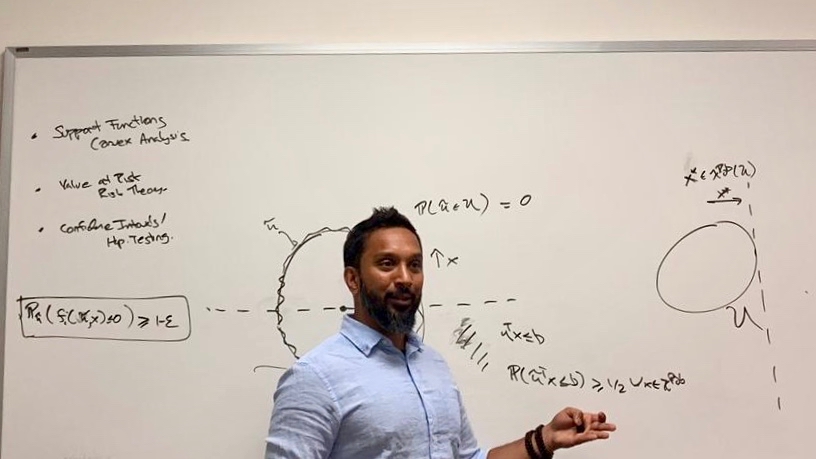Teaching - Selected Course Materials
Please feel free to use/adapt these materials in your own classes. If you do, please drop me a line. I enjoy learning about how others are using these cases in their own classrooms.
Associated datasets, example code, and teaching notes are also available upon request.
Mini-Course: (Some) Stochastic Foundations of Decision-Aware Learning
- National University of Singapore (NUS), PhD Elective
- Syllabus
- Lecture Notes
This (very brief) mini-course is a whirlwind introduction to some of the tools used in the analysis of decision-aware learning algorithms and concentration inequalities.
AI: Seed for Change or Existential Threat?
- USC Marshall, Undergraduate Elective
- Curriculum Development (2021), Instructor (2022)
- Syllabus
This is a new undergraduate seminar that is part of Marshall’s Business Analytics and AI concentrations. In this seminar we explore questions surrounding artificial intelligence (AI) and machine learning in context of business and society. Through conversations with some of most respected thinkers in Artificial Intelligence across business, academia, and non-profits, we will discuss
- What is Artificial Intelligence exactly? What can it do? What can’t it do?
- What are some of the ways in which businesses and social enterprises are leveraging AI to effect change? What are the ingredients for success and the pitfalls to avoid?
- How does AI erode our privacy and safety? What are the ethical and moral implications of AI systems?
- How can we use AI to combat systemic racism, climate change and global poverty, without risking losing our own humanity to the cold-hearted logic of a machine?
Although this class focuses on guest speakers and group discussion, at the end of the day, answering these questions will fall to you and your peers as our next generation of leaders. You will be the ones responsible for developing AI and shaping it to as a tool for change, either for better or worse. What time better than now to start?
Still not excited? See what Marshall’s Dean has to say about the course.
Workshop on Expositional Writing in Mathematics
- USC Marshall, PhD Elective
- Curriculum Development (2020), Instructor (2021)
- Syllabus
This workshop focuses on clear expositional writing for mathematics. Its structure mirrors writing composition classes at good liberal arts schools and generally involves
- Limited lecture from me
- Students writing short pieces every week
- Students editing peer work with feedback every week
Why take a dedicated course on mathematical writing? The answer is simple: writing is hard. Many students (and some faculty) believe you can learn to write well “on the fly,” i.e, as you draft novel research results for publication. Unfortunately, this strategy is incredibly challenging because it conflates two hard tasks: learning to write and learning to perform research. Said another way, learning to write well is very difficult if your subject matter is an idea that you and your advisor only fully understood last week. By disassociating the subject matter from the act of writing, itself, this course hopes to help students refine their skills as expositors without having to struggle through the underlying mathematics.
Selected Course Materials
Additional course materials to be posted soon. As a sample,
- Consider this excellent article by Professor Michael McIntyre that we discuss at length in class. Many of these ideas form the backbone of the course.
- Introductory lecture (a particularly heavy lecture)
Later lectures explore topics like constructing an effective introduction, phrasing a theorem, organizing a proof, and structuring an effective talk.
Stochastic Foundations of Prescriptive Analytics

- USC Marshall, PhD Core Class
- Curriculum Development (2020), Instructor (2021)
- Syllabus
This is a course covering the core probability theory and stochastic analysis necessary for modeling and analysis in data-driven optimization, a.k.a., prescriptive analytics. The goal of this course is to provide students with a rigorous theoretical background to enable them to pursue their own research in these areas. This course is not meant as a first course in probability theory nor a formal treatment of measure-theoretic probability. Rather, the focus is on the probability tools most commonly used to analyze algorithms in data-driven optimization, machine learning, and personalization.
Topics covered include:
- Measure Theoretic Foundations
- Conditional Expectation
- Asymptotics of Random Varibables
- Concentration Inequalities
- Uniform Laws of Large Numbers
Applications covered center on data-driven optimization and the analysis of various methods (SAA, Empirical Bayesian Methods, Predict-then-Optimize, Debiasing Approaches, etc.)
Lecture notes to be posted soon.
Marshall Undergraduate Research Seminar I

- USC Marshall, Undergraduate Elective
- Curriculum Development (2020), Instructor (2021)
- Syllabus
Evidence-based decision-making is becoming ever-more crucial in our world. But where does such evidence come from? In most cases, it stems from research – conducted by us or by others. We produce and consume research both when considering global, “wicked” problems such as “How can we root out systemic racism?” and also in the minutia of day-to-day life, such as “Which webcam should I buy for online teaching?” Moreover, with the increasing prevalence of misinformation and “fake news,” our success hinges not only on our ability to synthesize data, but to critically distinguish good data from bad and bad data from outright lies.
This research seminar focuses on developing the skills to be an effective researcher, and to communicate that research effectively. Along the way we will discuss the ways that research exists inside and outside academia, and how it supports various industries in achieving their goals. The primary deliverable and goal for the seminar is to develop (over the course of the semester) a viable research proposal for an undergraduate thesis.
Selected Thesis Proposals
My inaugural 2021 class was entirely online because of the COVID-19 pandemic. Nonetheless, they produced some impresive undergraduate thesis proposals. Browse some of the abstracts (posted with permission) below.
- Measuring Digital Upskilling Success by Spencer Xie
- Assessing Frameworks of Data Privacy by Dylan Singh
- Does the current structure of Special Purpose Acquisition Companies expose financial markets to excessive risk? by David Sera
- How to Become the Top Player in an Evolving Market: The Role of Patent Portfolios in on the Development of Sustainable Competitive Advantages for Software as a Service by Tiffany Chou
- Determining Drivers of Customer Loyalty for Communication Service Providers to Enable Cost Savings and User Retention by Sanika Sahasrabudhe
Marshall Undergraduate Research Seminar II
- USC Marshall, Undergraduate Elective
- Curriculum Development (2020), Instructor (2021)
- Syllabus
This course is a continuation of Marshall Undergraduate Research Seminar I where a select group of undergraduates choose to execute on their thesis proposal by performing the research and ultimately writing an undergraduate thesis. Students who successfully complete a thesis are conferred Marshall honors at graduation.
Data Analysis for Decision Making
- USC Marshall, Undergraduate Core (Business Majors)
- Curriculum Development (2014), Instructor (2015, 2017)
- Awarded the 2016 Evan C. Teaching and Learning Innovation Award for the redesign of this course.
- Syllabus
Course Description: Every aspect of the firm – organizational structure, marketing, product design, and strategic planning – is shifting towards data-driven decision-making. The goal of this course is to help you develop your skills as a data-savvy manager. To that end, we study several basic analytics techniques, focusing on how to apply them in practice, interpret their output, build intuition, and leverage them in decision-making.
Case Materials
The above course centers on a case studies. I developed these case studies not only to illustrate various data-analysis techniques, but also to teach students how to integrate data analysis with more qualitative judgements to guide decision-making. Data sets and teaching notes for each of these cases is available upon request.
- Winning an Election – Case – Questions
- This case explores issues in A/B testing by analyzing the results of an email campaign targeting potential voters in an election. The context of the case draws strongly on the 2008 US Presidential Election and highlights a high-impact application of anaytics.
- Dashboarding at Applichem – Case – Questions
- The case explores the difficulty around good metric creation in guiding strategic direction of a firm and the value of dashboarding. The context builds upon the classic Applichem HBS Case in operations.
- Trojan Horse: Unexpected Style at Your Door – Case – Questions
- This case introduces binary classification in context of a subscription fashion service loosely based on Trunk Club or Stitch Fix. Students not only practice fitting binary classification models, but also see how adopting these models affect both upstream and downstream operations decisions, and how they can be calibrated for maximal revenue impact.
- Chowhound: Food for Thought – Case – Questions
- This case explores a quantitative approach to consumer market segmentation through unsupervised clustering techniques in context of fictional meal-delivery service loosely based on GrubHub. The case empowers students to interpret cluters as market segments to generate testable, data-driven hypotheses about how to improve the business.
- Targeted Promotions at ArtZee – Case
- This case explores personalized promotions and asks students to assess the value of a candidate promotion from an pilot A/B test. The emphasis of the analysis on identifying heterogeneous effects within the customer population, and using this knowledge to tailor the promotions. Issues around fairness, discriminatory pricing, branding risks, and strategic customer behavior naturally arise in discussions. The context is based on a fictional high-end art seller similar in concept to Etsy.